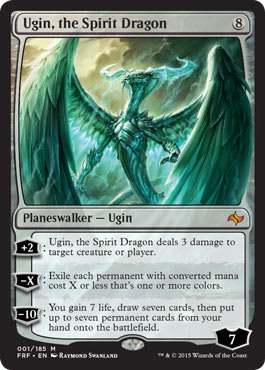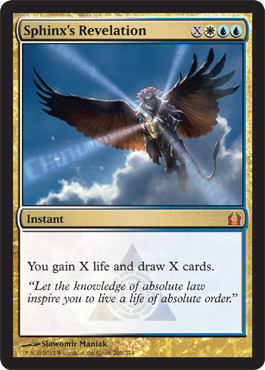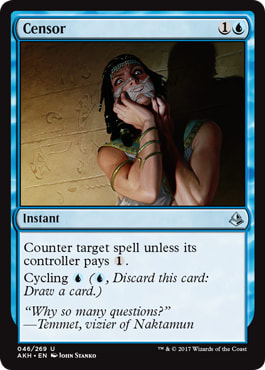One of the first things I like to do in a format is think about history. What does a format look like? What is it similar to from the past? What decks are possible in the world, and how might the successes of the past be turned into lessons that could help bring about successes for the future?
History isn't always applicable to every situation, but oftentimes there can be a really valuable shortcutting in the work done to develop a deck from examining a deck from the past.
"Nothing is ever really lost to us as long as we remember it."
When Sphinx's Revelation started out in Standard, I was actually pretty locked in on Boros Aggro, a "Big and Small" style build of Red that I'd end up winning a great deal of money with the deck, though by the time Born of the Gods was out, I was basically locked on ![]()
![]() control completely. The deck would bring me back to the Pro Tour after I hit with a third place finish with the deck, defeated by the excellent Jadine Klomparens piloting Black Devotion.
control completely. The deck would bring me back to the Pro Tour after I hit with a third place finish with the deck, defeated by the excellent Jadine Klomparens piloting Black Devotion.
Here is that list:
U/W Control | Born of the Gods Standard | Adrian Sullivan, 3rd Place Grand Prix Chicago
- Creatures (1)
- 1 Aetherling
- Planeswalkers (5)
- 1 Elspeth, Sun's Champion
- 4 Jace, Architect of Thought
- Instants (17)
- 1 Celestial Flare
- 1 Cyclonic Rift
- 1 Deicide
- 1 Essence Scatter
- 1 Last Breath
- 1 Render Silent
- 1 Syncopate
- 2 Quicken
- 2 Dissolve
- 2 Azorius Charm
- 4 Sphinx's Revelation
- Sorceries (9)
- 2 Divination
- 3 Planar Cleansing
- 4 Supreme Verdict
- Artifacts (2)
- 1 Darksteel Ingot
- 1 Elixir of Immortality
- Lands (26)
- 5 Island
- 6 Plains
- 3 Mutavault
- 4 Temple of Epiphany
- 4 Temple of Enlightenment
- 4 Hallowed Fountain
- Sideboard (15)
- 1 Deicide
- 1 Glare of Heresy
- 1 Celestial Flare
- 1 Debtor's Pulpit
- 1 Blind Obedience
- 1 Trading Post
- 1 Jace, Memory Adept
- 1 Ratchet Bomb
- 1 Dispel
- 1 Negate
- 1 Opportunity
- 2 Gainsay
- 2 Last Breath
This is one of those rare lists where I felt like I brought the exact right 75 cards to the event.
And, of course, not only is the deck conceptually legal in Pioneer, it has a remarkable incentive for playing it as well.
Sam Black said something about Pioneer when the format first started: find the broken card, and prove it. You should, he felt, be breaking the format. There are arguments that in the current version of Pioneer, perhaps Mono-Black Aggro is good enough that it will warrant a ban of Smuggler's Copter, but aside from that, the format looks like it is settling down nicely. Now I think we are largely at a different point: you need to have a deck that can just do something powerful that wins the game.
Well, it costs eight mana, but my newest version of ![]()
![]() Control can do that, two different ways:
Control can do that, two different ways:
Whether it is Ugin, the Spirit Dragon or a Sphinx's Revelation for five, it is rare to lose the game when you make that play. Sphinx's Revelation for five is so correlated with victory for me in Pioneer, I think I've lost the game once when I did it and untapped. ![]()
![]() Control is uniquely suited to be able to try to make that play because essentially the rest of the deck is set up to simply deny the opponent a victory in any number of ways.
Control is uniquely suited to be able to try to make that play because essentially the rest of the deck is set up to simply deny the opponent a victory in any number of ways.
I built a number of initial versions prior to the settling in of the format, really aggressive in my use of two-mana counters, with four copies of Censor - a card I really love in many formats - and several copies of Dovin's Veto. Unfortunately, after the last round of bannings, as Black Aggro really took off, Censor and Dovin's Veto were a kind of luxury that couldn't be indulged in, and the deck really started to shift until I got to my current point. Via the nature of natural selection, Black Aggro gobbles up a lot of the main deck problems that you might find demanded the Censor and Dovin's Veto, so it works out quite well.
It would be awesome if Censor was awesome, but in a world where the most popular and successful deck is filled with typically thirteen-plus 1-drops, it is a luxury that can't be afforded.
U/W Control | Pioneer | Adrian Sullivan
- Planeswalkers (7)
- 1 Narset, Parter of Veils
- 1 Teferi, Hero of Dominaria
- 1 Teferi, Time Raveler
- 1 Ugin, the Spirit Dragon
- 3 Jace, Architect of Thought
- Instants (15)
- 1 Blink of an Eye
- 1 Commit // Memory
- 1 Disallow
- 1 Dig Through Time
- 1 Render Silent
- 1 Syncopate
- 2 Blessed Alliance
- 3 Sphinx's Revelation
- 4 Azorius Charm
- Sorceries (9)
- 1 Quicken
- 2 Hour of Revelation
- 2 Jace's Triumph
- 4 Supreme Verdict
- Artifacts (3)
- 1 Elixir of Immortality
- 2 Ratchet Bomb
Astute readers will count 61 cards and 16 sideboard slots; this is on purpose. In the main, I'm likely to cut the Quicken or, slightly less like, the Teferi, Time Raveler. In the sideboard, I'm likely to cut one of the counters, or, less likely, the second Gisela, the Broken Blade. In each case, it is because these particular cards are carrying out a role that another card is taking care of, and I'm uncertain that one or the other card is at its best.
The deck is basically three things: draw, removal, and mana. Some cards attempt to set up more than one of these elements at the same time. Altogether, this can make for a formidable means of stopping the opponent from killing you. Card draw can be time consuming, but it also brings you closer to the answers that are necessary. The ubiquity of Black Aggro has streamlined much of what the deck needs to do to successfully react to opposition - all to the benefit of the deck! While the deck isn't perfect against Black Aggro, I'm enjoying a solidly positive win percentage against the deck with ![]()
![]() Control, even in Game 1s.
Control, even in Game 1s.
One of the big ways that I've helped to do that is to streamline the package of countermagic. I used to run nine to ten counterspell depending on the total counts of Dovin's Veto and Censor, and now I'm down to four. Drawing a counterspell versus aggressive decks can be helpful if they are going to finish you off with a Boros Charm, but it isn't all that hot when you're trying to keep a Smuggler's Copter from killing you.
Even these four counterspells are very carefully chosen. Commit (of Commit // Memory) can work as a pure removal spell, for example. Each of the other three have a specific purpose, whether it is the niche of graveyard removal with an upside of going live on turn two (Syncopate), having an important Stifle effect (Disallow), or an unusual but powerful effect in shutting down a turn (Render Silent). This last one many people replace with Absorb, which is a fine card, but I find that Render Silent is game changing in many more instances than Absorb - typically a late game can involve a test spell before the real spell, and Render Silent just shuts down that strategic moment for the opponent, which is marvelous.
The card draw package is based on a combination of Planeswalkers, pure card draw spells, and Mystic Sanctuary. Sanctuary does an incredible amount of work in this deck by artificially inflating the numbers of any spells you've actively used, which if you've used them already, likely have a real value. Having a virtual equivalent of five Supreme Verdict in the matchup you want it is fantastically powerful.
The return to Jace, Architect of Thought came about because of the way it could help bridge games against aggressive decks, as well as the sheer power of the card in digging through your deck. Filtering to your best spells makes Mystic Sanctuary, again, more powerful, and deeply contributes to simply staying alive, even if Jace should die. And if Jace doesn't die, Jace's Triumph is a fairly absurd card.
In the mix of the card draw is a single Narset, Parter of Veils joined by a Memory (of Commit // Memory) and a Geier Reach Sanitarium to add that angle by giving an opportunity for a lockout that comes surprisingly often. Even without the combo, all of the cards are great on their own, especially with Memory providing an escape valve should something - god forbid! - happen to your Elixir of Immortality, which provides an absurd inevitability that allows you to ignore basically all kinds of answers from the opponent, since you will just get any old threat back.
At the top end of all of this, a Sphinx's Revelation, should it ever hit for five, usually means that the game has absolutely ended. Elixir of Immortality, again, is able to ensure that you'll never run out of a deck, so even a massive Sphinx's Revelation isn't life threatening.
Ultimately, the evolution of removal in the deck came with a lot of effort. After the removal of Censor, four Azorius Charm became a necessity to make Mystic Sanctuary much more powerful. Last Breath, a card I usually love, was missing too often. Hour of Revelation got the nod over Detention Sphere because, despite being slower, the amount of times you needed to wipe out a diverse set of cards was quite large - not to mention the value from the times your opponent presumes their Naturalize effect will be useful after board. Ratchet Bomb, originally a sideboard card, just became reasonable enough to place in the main for its speed and versatility. Finally, Ugin, the Spirit Dragon and Teferi, Hero of Dominaria are not only removal spells, but serve as finishers as well.
As it stands, I'm absolutely loving this deck. I've dodged a 5-0 in leagues so far, but I've racked up so many 4-1 finishes, I'm sure one is just around the corner. Especially if you're a control player, I hope you like this deck as much as I do!
As you read this, I'll be celebrating a birthday as well as about 26 years of playing Magic. I've loved this game for so long, and I've gotten to meet so many luminaries of the game throughout the years. I'm so incredibly thankful to Magic, and to all of you out there who have shared my articles and said hello to me at events and more.
Thank you all!
Follow me on Twitter! @AdrianLSullivan
Follow me and subscribe on Twitch! /AdrianLSullivan




























